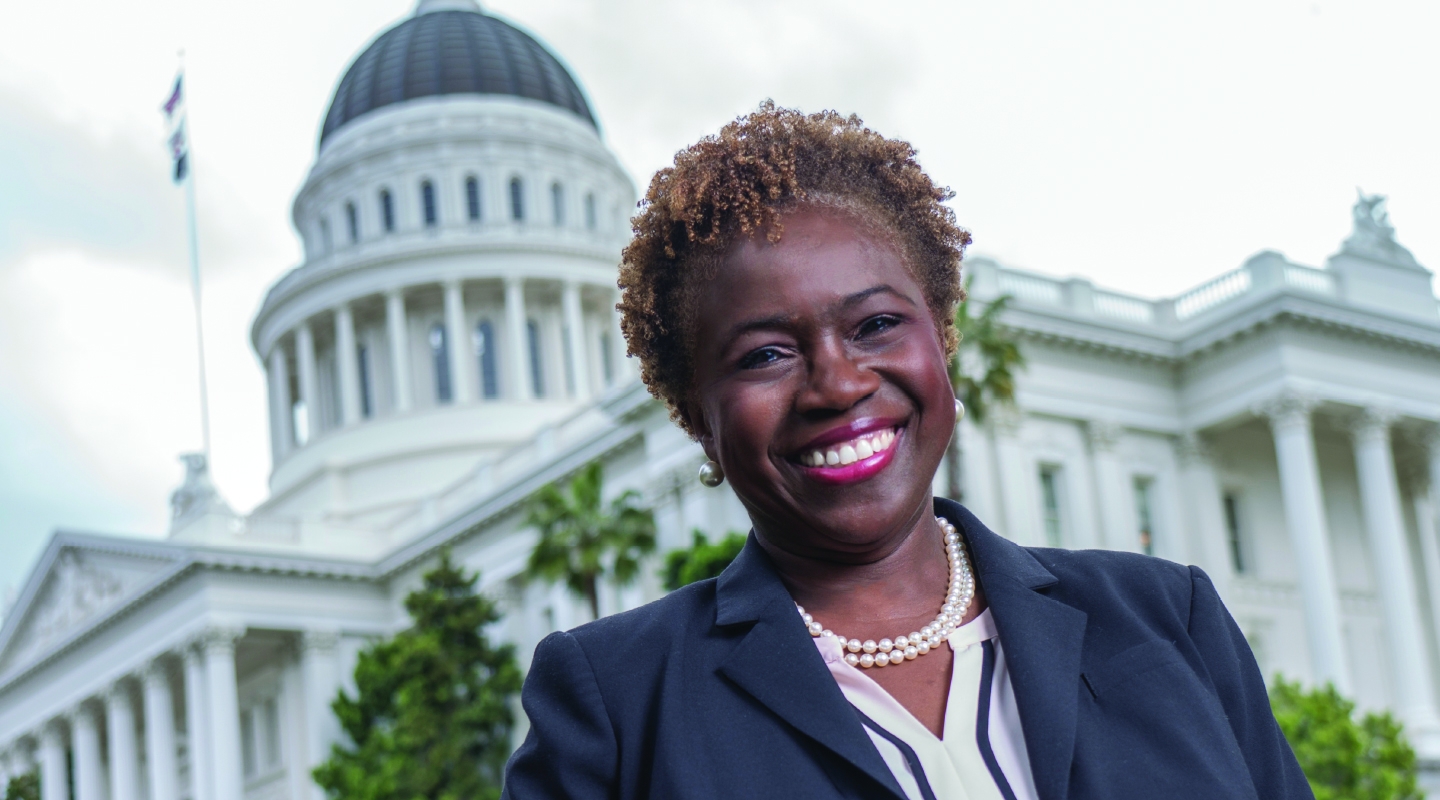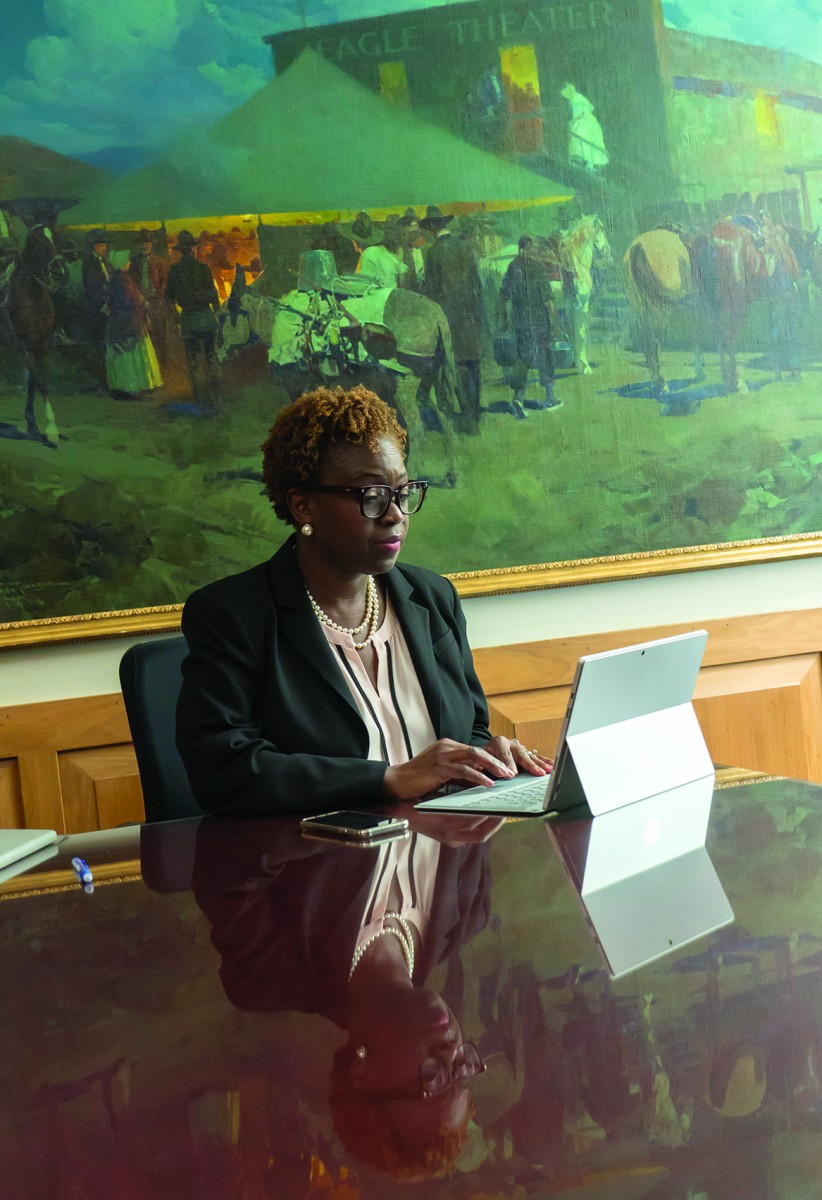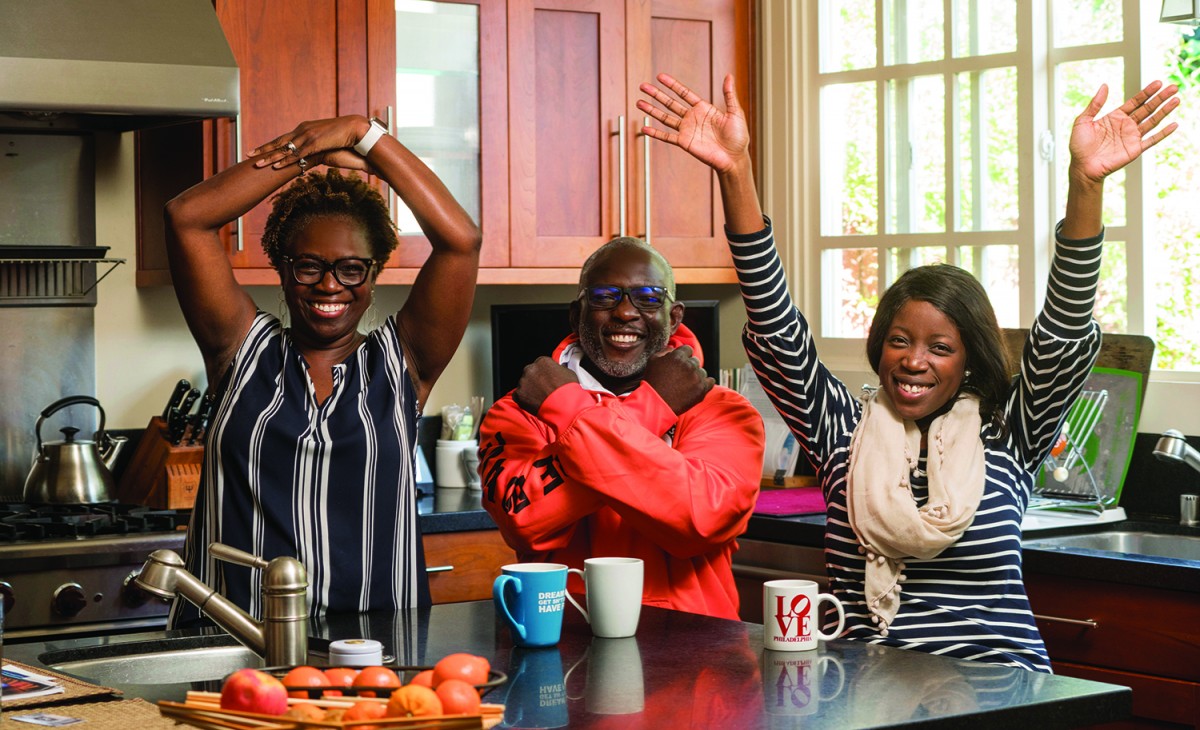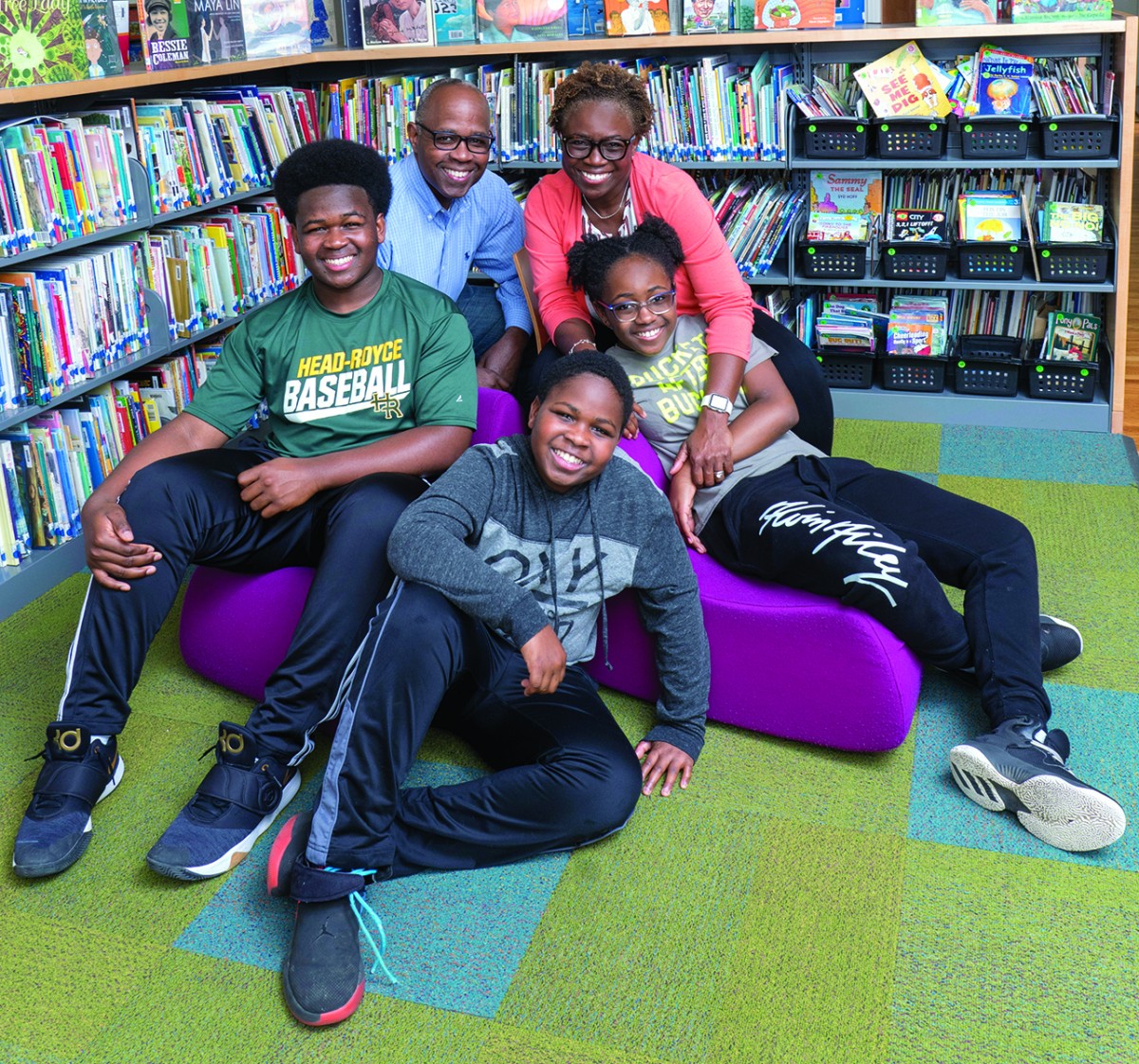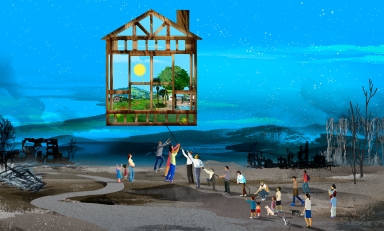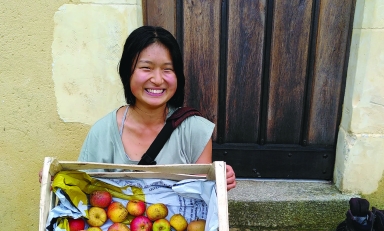Armed with a briefcase full of challenges facing the nation’s largest higher education system, Lande Ajose ’87 brings new energy to Sacramento
Lande Ajose ’87 was recently going through some old papers when she found a loan that she had taken out as a student at Oxy more than 30 years ago. “It was a national direct student loan for $4,000,” she says—an “impossible” amount at the time—“and it took me 15 years to pay it off. Four thousand dollars is nothing now. Right?”
But the true cost of college, then or now, is not just tuition, according to Ajose, who brings a wealth of experience to her new role as California Gov. Gavin Newsom’s senior policy adviser for higher education, a role she began in January. It’s actually more expensive in many places for a student to go to a community college than to go to a Cal State University or a University of California campus, she says, “because you cannot get the financial aid at a community college that you would get from a CSU or a UC.”
With nearly 3 million students spread out over 115 community colleges, 23 CSUs, and 10 UCs, California is home to the nation’s largest state-run higher education system. But just over 50 percent of them earn associate degrees in three years or bachelor’s degrees in six. One of Ajose’s top priorities in the governor’s office is to do all she can to help students complete their degrees in four years.
“There’s lots of data and research that show the longer that you take, the less likely you are to obtain your degree. And those degrees matter,” she says. “The best way to serve as many Californians as possible is to make sure that there is broad access to higher education; that there are multiple, flexible platforms for achieving a degree; and that we take very seriously the imperative of completion.”
Raised by a single mom in an immigrant household in Berkeley, Ajose embraced all that Oxy had to offer, including four years of Glee Club, and forged close friendships that endure to this day. (She has three siblings, two of whom followed in her footsteps in attending the College.)
Ajose developed her social sensibilities at Occidental in an era when colleges nationwide were being urged to divest from companies that did business with South Africa’s apartheid government. “It was a time of activism and a time of promise,” says the diplomacy and world affairs major, who also was involved in the Occidental College Coalition for Access and Choice, an organization formed in response to the Reagan Administration’s proposed financial aid cuts. Along the way, she learned how to engage in difficult conversations with her professors and even college administrators—and to bring her evidence-based A-game.“Whether I was taking a math course, or Rocks for Jocks, or feminist literature, or a DWA course, they all started from this understanding of ‘What is the evidence? … What does that mean for the values that we espouse?’” she says. “That is very much what my career has been about. The idea that I could think about the meager beginnings that my family had in this country—and do something to systemically allow others to be able to have access to that kind of opportunity—is a calling.”
While completing her master’s in urban planning at UCLA, Ajose started to home in on the relationship between employment and education. Through her work in various higher education capacities since completing her Ph.D. at MIT, she has increasingly begun to recognize the roles both play in providing Americans with greater social mobility. “For the vast majority of us—and particularly when you start to disaggregate the data demographically and look at particular communities—education ends up being the predictor of social mobility and economic stability,” she says.
In his first address to Congress in February 2009, President Barack Obama ’83 set an unprecedented economic goal for the nation: that the country would grant an additional 5 million degrees by 2020. In 2010, a philanthropic leader in California secured enough financial support to commission a project: California Competes, a nonpartisan organization that provides policy recommendations for higher education in the state. When Ajose came on board as the organization’s deputy director in 2011, she was tasked with helping to figure out the state’s portion, which ended up being 2.3 million degrees to remain economically competitive.
“We were instrumental in helping to initiate the conversation about rethinking how we fund our community colleges,” says Ajose, who was promoted to executive director in 2015. More recently, California Competes has expanded its efforts to focus on adults and adult learners. “A significant number of our students are over 25,” she says, “and many of them have families. How do we then think about the kinds of policies that we need to have in place California to educate all of our residents, not just the 18-year-olds?
“The work that we have done over the last seven years really was focused on how do we change the agenda for what needs to be considered for higher education in this state,” she continues. “And I think we made a pretty significant contribution considering we were a small organization of five.”
It goes without saying—but we’ll say it anyway—that California is in a cost crisis. “No matter where you live in this state, it’s expensive, and that hits students in particular ways,” Ajose says. The opportunity to tackle college affordability head on is what brought her to Sacramento to work with Newsom.
First up: addressing the overall student experience. “We’re going to look at everything related to higher education through the lens of the total cost of attendance,” she says. “You’ll see in this budget a commitment to mental health services for students, to basic needs, so that we can reduce the kind of food and housing insecurities that, shamefully, many students face these days.”
In her ongoing role as chair of the California Student Aid Commission, which distributes $2.5 billion in Cal Grants and other forms of financial aid to roughly 400,000 Californians each year to help them complete their degrees, Ajose is uniquely poised to address growing concerns about the cost of attendance—and whether California needs fundamental financial aid reform.
Unlike the climate from which the California Master Plan for Higher Education emerged in 1960—spearheaded by then-Occidental President Arthur G. Coons 1920 and Glenn Dumke ’38, former dean of the College—today college is no longer free.
“Financial aid is not an inexpensive investment,” Ajose says. “It could cost as much as twice the amount as we have now to really account for the total cost of attendance for all of our students.” Yet she is convinced that Californians can still live out values first championed in the Master Plan without going under, financially speaking.
“We need to understand how we are going to support everyone to be able to go to college over time and to be able to pursue the kind of degree and credential that they most want to pursue,” she says—and that includes people from low-income households and communities of color. “People don’t have the same expectations for underrepresented communities that they have for others. It is important that we hold up an expectation that everyone can have a four-year degree.”
There’s a lot of anxiety surrounding college admissions these days, fueled by the recent bribery scandal and the seeming randomness of the decision-making process. Which is why Ajose, a mom of three, is keen on seeing colleges provide clearer and more predictable criteria to help reduce that angst.
“What is important is for us to remember that there are more than just 50 colleges in this nation,” she says. “For many students, particularly students for whom finances are an issue, two years of community college and then two years at a four-year institution might be a better pathway. It means challenging our own notions of what the college experience is. Too often, the college you get into becomes this reflection of your own self-worth and your identity.
“And that’s not what it’s about. It’s really about trying to find a place that’s a good match for you—a place where you can learn and grow and become a better person.”
Gonzales is a freelance writer in Fair Oaks. This is her first story for the magazine.

